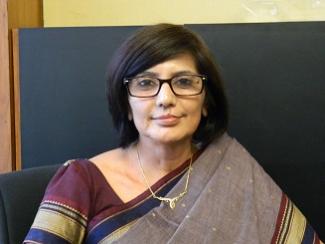
Rita Banik, breast cancer survivor and founder of RACE to Rein-in-Cancer, had to face this and many painful falsities and misrepresentation during her treatment. She shares some of the hurtful things that people say. This Breast Cancer Awareness Month, she emphasizes the need to increase understanding about cancer in society and importance of early detection.
Breast Cancer (BC) has become a dinner talk disease. It has been predicted that if measures are not taken right away then by 2020 Nigeria, Kenya and India will become topmost countries in the list of mortality due to BC. Indian mentality is still facing turmoil between breast cancer awareness and social stigma of the mere word ‘breast cancer’. The fact still remains that most of the BC patients and survivours in our country shy away from talking about it in public. Many find themselves feeling guilty for having had BC.
I was diagnosed and treated for BC in 2006 at New Delhi, India. During my treatment each day brought a new shock wave from the negative attitude of people I met. I would like to share some of the discouraging statements made by people:
- BC is infectious – there were times during my chemotherapy when I felt that I was not invited to places simply for the fear of getting an infection from me. Who could explain to them that my body was more susceptible to getting an infection from others as the immunity level and WBC counts go down drastically at that time.
- The ‘Oh! You are still alive’ look – As if a healthy look had become my enemy!
- BC is hereditary – There was a strong belief that my daughter would also get BC and I was supposed to immediately worry about her marriage and future. As if I didn't have enough to worry about.
- Removing the whole breast - Mastectomy is the only line of treatment for BC. The truth is that mastectomy is not always medically necessary and is not routinely recommended. Women should be made aware that there are alternatives to mastectomy that have similar, or even better results with improved quality of life. For instance breast conserving therapy or lumpectomy.
- Reconstruction is unthinkable – There was/is a big social stigma attached to reconstruction surgery, mostly accepted as cosmetic surgery hence a waste of money. I felt like I was being judged in a court room for taking such a ‘bold step’.
- Cannot handle responsibility - She is not well, so she cannot participate in any of the family decisions nor can be given any job of responsibility. Due to this kind of thinking I also lost my school job.
- Biopsy spreads cancer – It spreads the cancer cells to other organs of the body, hence it should be avoided. Not true by the way.
- Restriction of diet and movement – I very often heard that as a BC patient my movements should be restricted, I should not step out of the house nor eat all kinds of food.
- Line of treatment – Many a times relatives do not believe the doctor, rather start comparing the treatment with that given to other patients. It is always advisable to get a second opinion but not to the extent that one goes from one doctor to another confusing the patient completely.
- Live with guilt – I hear versions that depression, ill behaviour towards others or a person who has sinned in past life gets cancer.
If you meet 100 people you might hear 200 different theories regarding cancer. It is all due to lack of awareness, holding on to the myths, thereby, giving rise to permanent fear for cancer. I have been one of those fortunate women, who was not let down by discouraging issues and toxic behaviour. I crossed the challenging path bravely and took up the responsibility to spread awareness about cancer in society, eradicate the myths and make people understand the Importance of Early Detection.
“Strong women don’t play victim, don’t make themselves look pitiful.
They stand and they deal!”
~Mandy Hale






